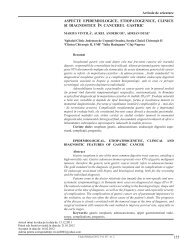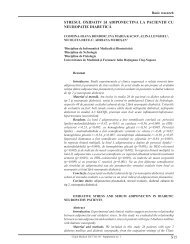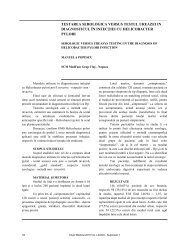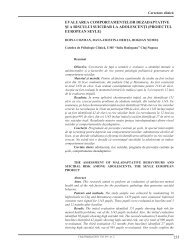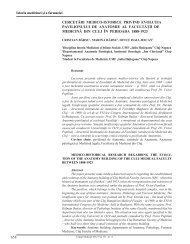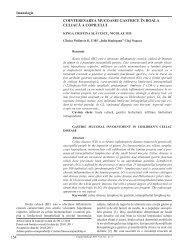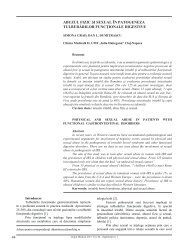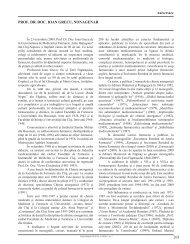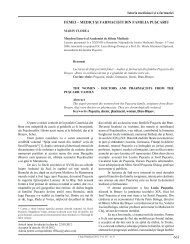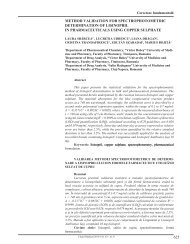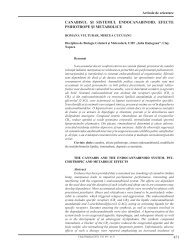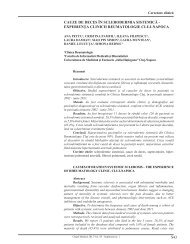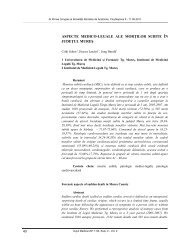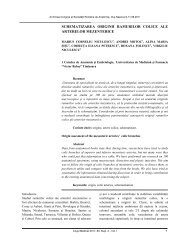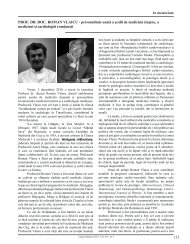You also want an ePaper? Increase the reach of your titles
YUMPU automatically turns print PDFs into web optimized ePapers that Google loves.
<strong>Clujul</strong> <strong>Medical</strong> 2006 vol. LXXX - nr. 1<br />
Screening for metabolic syndrome in persons with newly<br />
diagnoses type 2 diabetes<br />
CAMELIA GEORGETA RĂCĂREANU, GABRIELA ROMAN,<br />
Clinical Center for Diabetes, Nutrition and Metabolic Diseases, Cluj-Napoca<br />
Summary<br />
The metabolic syndrome belongs, along with the diabetes, dyslipidemia,<br />
obesity, to the nutritional metabolic diseases. The metabolic syndrome it’s a great health<br />
problem worldwide, being one of the major causes of cardiovascular disease,<br />
responsible for a growing number of premature deaths throughout the world<br />
The study enrolled 1633 participants with newly diagnoses type 2 diabetes,<br />
both from urban and rural settings. The parameters recorded were the following:<br />
identification information, personal and familial medical history – focused on<br />
cardiovascular and metabolic pathology, lifestyle information and anthropometrical<br />
data: height, weight, abdominal circumference, and body mass index, calculated using<br />
the World Health Organization criteria for the classification of obesity, the blood<br />
pressure was measured, fasting glycemia, total cholesterol, HDL-cholesterol and serum<br />
triglycerides.<br />
The diagnostic criteria for diabetes mellitus, according to World Health<br />
Organization. Body mass index (BMI) was calculated using the World Health<br />
Organization criteria for the classification of obesity. The metabolic syndrome as<br />
defined by IDF (International Diabetes Federation) 2005 criteria. Further, the<br />
cardiovascular risk was calculated, using the Euro 98 diagram for the primary<br />
prevention of the coronary heart disease.<br />
Metabolic syndrome is an independent clinical indicator of micro- or<br />
macrovascular complications in diabetes. Personal medical history shows the presence<br />
of cardiovascular disease in 27.3 % of the subjects, stroke for 5,9 %, obliterant<br />
peripheral arteriopathy 27.3%, hypertension 65.3 %, and obesity 61.2 %. The<br />
prevalence of obesity (BMI>30kg/m 2 ) was higher in women (63,9%) comparing with<br />
men (58,26 %); 13,5 % was normoponderal. The risk of CVD associated with the<br />
metabolic syndrome was statistical significance after adjusting for conventional<br />
cardiovascular risk factors.Using the new IDF criteria, the prevalence of the metabolic<br />
syndrome in the general population is 84.72 % and is more frequent in women (88.6 %)<br />
than in men (78.6 %).<br />
In conclusion, The metabolic syndrome is an independent clinical indicator of micro- or<br />
macrovascular complications. The metabolic syndrome has a remarkable impact at an<br />
individual and population level, by its increasing frequency and the cardiovascular risk<br />
that it determines. The high prevalence in the population with newly diagnoses type 2<br />
diabetes, the high cardiovascular risk associated to the metabolic syndrome, and make<br />
of this condition an important problem for the medical practice, and draws attention to<br />
the need for intervention on the risk factors. The clinical management needs more<br />
aggressive cardivascular risk-factor control, particulary of obesity, glycaemia, HDLcholesterol,<br />
and hypertension.<br />
Key words: metabolic syndrome, cardiovascular risk, central obesity,<br />
dyslipidemia, hypertension.<br />
102



